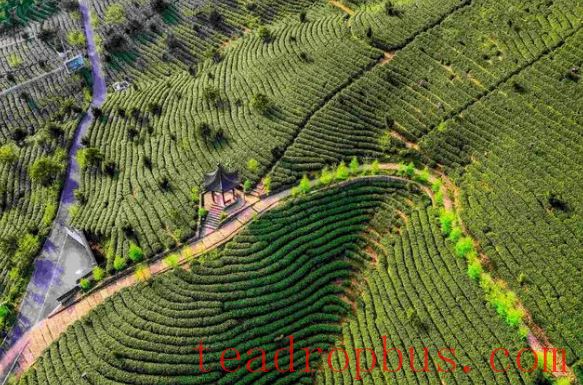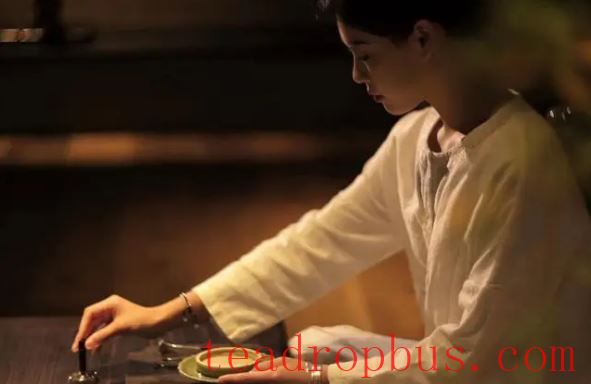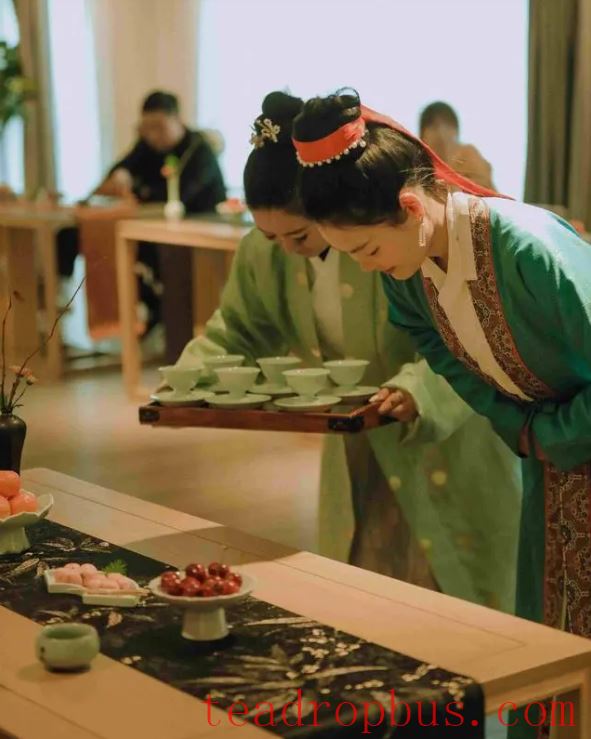The “Taiyin Yaolu” integrates the “ancient elegance” of the Zhejiang school into the details of its Tea space, while “Yumuyun” hides the “craftsmanship spirit” within its tea wares. To promote systematic protection of the “Traditional Chinese Tea Processing Techniques and Associated Social Practices” project, to continue enhancing the golden reputation of “View the World's Tea Homeland in Zhejiang,” and to solidify the achievements of tea's intangible cultural heritage (ICH) application, the Zhejiang Provincial Department of Culture and Tourism recently launched the first batch of 25 provincial-level “ICH Tea Spaces.” These spaces integrate the display, dissemination, and experience of ICH projects with tea-related business activities, forming a unique “ICH Tea Life” form with regional characteristics.

▲ Anji Tea Garden
“Taiyin Yaolu”: Tea Drinking and Zither Appreciation
Situated by the Grand Canal, the “Taiyin Yaolu” ICH Tea Space combines tea culture and zither culture, two ICH projects. “The space focuses on local teas such as West Lake Longjing and Jiuzhu Hongmei, promoting the inheritance of tea culture,” said Chen Chengbo, founder of “Taiyin Yaolu” and a renowned domestic zither player. He expressed that both tea culture and zither culture are crystallizations of China's thousands of years of history, and he hopes that “Drinking Tea while listening to zither music” will become a leading or complementary element of emerging lifestyles. Through the fusion of tea culture and zither culture, it further enhances young people's cultural confidence and spiritual cultivation.
Chen Chengbo explained that since the 21st century, guqin art, recognized as an intangible cultural heritage, has been rediscovered by the public, attracting more and more young people and foreign tourists to the zither culture. Therefore, “Taiyin Yaolu” has established a dedicated zither training space and built a stage within the tea tasting area, holding tea culture exchange meetings and zither concerts at irregular intervals. “We select a tea to match each concert theme, and each tea gathering is accompanied by different qin players and tunes,” said Chen Chengbo.
In 2025, “Taiyin Yaolu” relocated to Dadao Road Historical District, participating in many temple fairs and markets with support from the local community, attracting more visitors to the Grand Canal area. Chen Chengbo introduced that while deeply practicing the strategy of promoting tourism through tea and enhancing tea through tourism, the space also fulfills the mission of cultural dissemination and exchange. For example, they regularly conduct “Guqin Enters Schools” public welfare activities and host salons for exchanges between traditional Chinese music and Western string music, creating unexpected sparks when traditional folk music meets Western string music. “An English teacher from Hangzhou No. 14 High School was attracted by a zither tune and decided to learn the zither, and has been studying for four years now,” said Chen Chengbo.
“Both tea culture and zither culture require our efforts to inherit and promote them. Our ongoing goal is to make more people understand tea and zither culture, driving the development of the space towards personalization and diversification,” Chen Chengbo revealed. Currently, he has invited experts and artists in Yue opera and Kun opera, along with qin players and tea masters, to create stage plays like “Phoenix Seeks Phoenix” and “High Mountains and Flowing Water,” which integrate tea culture and music culture, striving to establish a cultural landmark by the Hangzhou Canal.
“Yumuyun”: Experiencing the Unity of Tea and Porcelain
With the concept of “awakening the memory of protecting and inheriting ICH among the new generation,” “Yumuyun” ICH Tea Space relies on celadon tea wares, flower vases, and Longquan specialty ICH tea snacks. Through tea events imbued with Song Dynasty aesthetics and the style of Zhejiang, it promotes the living inheritance and integrated development of representative ICH projects such as traditional Longquan celadon firing techniques, traditional floral arrangement arts, and Huangguo making skills.

▲ Experiencing traditional ICH “Incense Seal Making” at “Yumuyun”
To allow more people to experience the perfect integration of ICH celadon tea wares, tea snacks, and tea gifts with modern lifestyle aesthetics, and to feel the artistic and practical values of porcelain ICH and tea ICH more intuitively, this tea space combines tea and porcelain, launching an ICH experience project called “Song Dynasty Tea Preparation.” It reproduces tea preparation utensils mainly decorated in celadon style and develops tea powder suitable for ancient tea preparation methods, showcasing performances of classical tea preparation.
“The fusion of Longquan celadon and tea culture highlights regional identity and preserves the roots of regional culture,” said Yan Shaoying, founder of the tea space and a representative inheritor of traditional Longquan celadon firing techniques. With her long-accumulated works, she founded “Yumuyun.” “This provides a good platform for study groups to experience local cultural characteristics and creates immersive experience scenes, allowing more tourists to have a more concrete sense and deeper impression of Longquan's humanities history, Longquan celadon firing techniques, and their artistic value,” Yan Shaoying stated. Since establishing this tea space, they have received numerous domestic and international tourists and study groups every year, playing a positive role in enhancing the reputation and prestige of Longquan celadon and the city.
Yan Shaoying noted that being selected as a provincial-level “ICH Tea Space” will effectively promote the deep integration of porcelain and tea ICH with tourism, technology, education, and other fields, not only extending the industrial chain but also increasing the overall value of the industry. “This also sets higher expectations for ‘Yumuyun.' We will focus on the application scenarios of ‘ICH Tea Life,' conducting cross-project and cross-category collaborations, enabling natural interaction between traditional crafts and ICH techniques,” she said.
“Yancha Jing Shan Zhu”: “Tea + Everything”
Zhou Fanglin is a representative inheritor of the Zhejiang provincial intangible cultural heritage – Jing Shan Tea Frying Technique. In 2025, he established “Yancha Jing Shan Zhu” in Jing Shan Town, Hangzhou. Here, he created areas for the Jing Shan Tea origin display, Song Dynasty culture exhibition, Jing Shan Tea cultural and creative products sales, Jing Shan Tea Art ICH Workshop experience, and youth study base. In 2025, Zhou Fanglin led Liu Wei, a district-level inheritor of Jing Shan Tea Frying Technique, to conduct over 100 live demonstrations of Jing Shan Tea frying, with over 20,000 participants experiencing it.

▲ Experience and performance of the Jing Shan Tea Banquet and Tea Soup
Meanwhile, Zhou Fanglin's daughter, Zhou Ying, was teaching tourists how to prepare tea by hand. “Grind the tea cake into fine powder, place it in a tea cup, add a small amount of boiling water to make a paste, then measure the tea and pour in hot water, stirring all the while with a tea whisk…” Influenced by her father's belief in “revitalizing Jing Shan Tea,” Zhou Ying, born in the 1990s, returned to Jing Shan after graduating from university to take up the baton of inheritance, promoting her hometown's tea culture.
In recent years, the father-daughter duo, together with surrounding tea gardens and factories, launched tea events such as ICH Jing Shan Tea frying experiences, Jing Shan tea preparation, pomelo tea making experiences, and more. They developed ICH tourism routes, linking sites like Jing Shan Temple, Jing Shan Village, Lu Yu Spring Park, and Shuangxi Chan Tea Pedestrian Street, allowing tourists to gain a profound understanding of the rich history of tea culture at Jing Shan Temple. They innovated tea derivative products, introducing experiences like open fire tea brewing and the first immersive Song Dynasty culture interactive experience project themed around Jing Shan Tea culture – the Jing Shan Banquet, enriching agricultural, cultural, and tourism experiences and consumption scenarios.
Zhou Ying believes that as times change, tea culture must constantly innovate. Zhou Ying spreads tea culture through